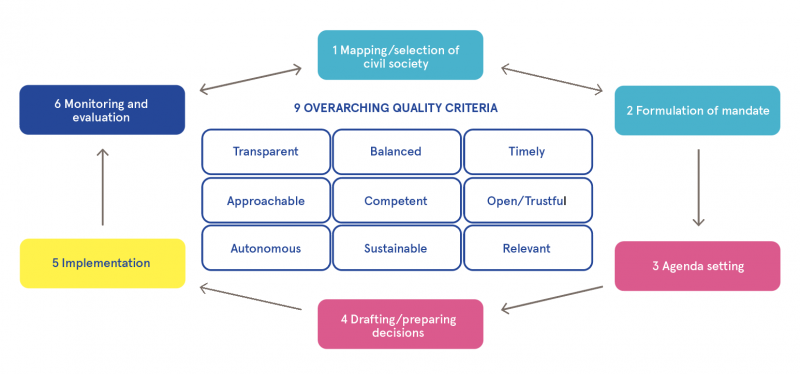Dillon, Lucy (2022) Quality standards and civil society. Drugnet Ireland, Issue 80, Winter 2022, pp. 29-31.
| Preview | Title | Contact |
|---|---|---|
|
PDF (Drugnet Ireland 80)
1MB |
The Civil Society Forum on Drugs (CSFD) has published a new report, entitled Quality standards of civil society involvement in drug policies.1 It presents a set of quality standards for policymakers and civil society actors to work towards meaningful collaboration and effective policymaking.
Background
The CSFD is an expert group of 45 civil society organisations in the European Commission that supports the commission in its drug policy formulation and implementation.2 Among its work carried out to date is in supporting and promoting quality standards. Its previous publications on the topic include Guidelines and recommendations for the implementation of minimum quality standards in drug demand reduction in the European Union by civil society organisations (CSOs),3 and the CSFD advocacy plan for the promotion and implementation of minimum quality standards in drug demand reduction.4 The authors define civil society involvement as follows.
Civil society involvement can be understood in a narrow sense by decision-makers; that is, they are solely seen as a mechanism to help policy-makers to implement decisions. But civil society is more than a mere tool of implementation. One of its greatest strengths is innovation, creativity and a vibrant connection to the most affected communities. It can enrich decision-makers with new ideas and new perspectives for future processes. Civil society can serve as a connector between the policy and the actual needs. It can add authenticity and legitimacy to policy processes. (p. 14)1
Quality standards
The current report lays out a new set of quality standards for civil society’s involvement in policymaking ‘to guide both decision-makers and civil society on how to create mechanisms that facilitate the building of dialogue and partnership between them’ (p. 6).1 They are structured around a planning–intervention–evaluation cycle with the CSO involvement in the policy process conceptualised as an intervention which involves both decision-makers and civil society (see Figure 1) (p. 6).1
Quality standards are attached to each of the six steps outlined, all of which are underpinned by the nine overarching quality criteria (see Figure 1). The report presents a detailed set of quality standards and the thinking that underpins them. While the report presents the standards and specific actions for each group, this article only presents the overarching quality standards here.

Figure 1: The planning–implementation–evaluation cycle of civil society involvement
1. Mapping and selecting civil society participants
For policymakers:
- An assessment of relevant civil society actors is conducted.
- Relevant civil society actors are selected to participate in policymaking.
For civil society actors:
- The actor is relevant, knowledgeable, and able to contribute in a meaningful way to decision-making.
2. Mandate formulation
For policymakers and civil society actors:
- Decision-makers involve civil society in the development of a common mandate for the civil society involvement mechanism/forum.
3. Agenda setting
For policymakers:
- Civil society is consulted in setting the agenda of policymaking.
For civil society actors:
- Civil society gives a competent, balanced, and transparent contribution to the agenda.
4. Drafting and preparing policy decisions
For policymakers:
- Decisions are prepared with the meaningful involvement of civil society.
For civil society actors:
- Civil society engages in a serious and professional way by ensuring a collaborative approach.
5. Implementation of policy decisions
For policymakers:
- Civil society actors are involved in the implementation of policy actions.
For civil society actors:
- Civil society actors implement drug policy interventions in a transparent and accountable way.
6. Monitoring and evaluation
For policymakers:
- Civil society provides relevant and meaningful input to the monitoring and evaluation of drug policies.
For civil society actors:
- Civil society contributes in a competent and professional way to the evaluation of drug policies.
1 Sarosi P, Fulga V, de Boer Y and Keane M (2021) Quality standards of civil society involvement in drug policies: report of the Civil Society Forum on Drugs. Amsterdam: Correlation – European Harm Reduction Network. https://www.drugsandalcohol.ie/34368/
2 For further information on CSFD, visit: http://www.civilsocietyforumondrugs.eu/
3 Civil Society Forum on Drugs (2020) Guidelines and recommendations for the implementation of minimum quality standards in drug demand reduction in the European Union by civil society organisations (CSOs). Amsterdam: Civil Society Forum on Drugs. https://www.drugsandalcohol.ie/34040/
4 Civil Society Forum on Drugs (2021) CSFD advocacy plan for the promotion & implementation of minimum quality standards in drug demand reduction. Amsterdam: Civil Society Forum on Drugs. https://www.drugsandalcohol.ie/33833/
L Social psychology and related concepts > Social inclusion and exclusion
MA-ML Social science, culture and community > Sociocultural aspects of substance use > Societal attitude toward substance use / public opinion
MA-ML Social science, culture and community > Community action > Community involvement
MP-MR Policy, planning, economics, work and social services > Policy > Policy on substance use
MP-MR Policy, planning, economics, work and social services > Programme planning, implementation, and evaluation > Quality standards
VA Geographic area > International
Repository Staff Only: item control page